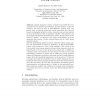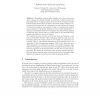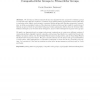13 search results - page 1 / 3 » Extracting Group Signatures from Traitor Tracing Schemes |
EUROCRYPT
2003
Springer
13 years 10 months ago
2003
Springer
Abstract. Digital Signatures emerge naturally from Public-Key Encryption based on trapdoor permutations, and the “duality” of the two primitives was noted as early as Diffie-He...
CRYPTO
2000
Springer
13 years 9 months ago
2000
Springer
Traceability schemes allow detection of at least one traitor when a group of colluders attempt to construct a pirate decoder and gain illegal access to digital content. Fiat and Ta...
CRYPTO
2001
Springer
13 years 9 months ago
2001
Springer
We deal with the problem of a center sending a message to a group of users such that some subset of the users is considered revoked and should not be able to obtain the content of...
EUROCRYPT
2010
Springer
13 years 9 months ago
2010
Springer
We develop an abstract framework that encompasses the key properties of bilinear groups of composite order that are required to construct secure pairing-based cryptosystems, and we...
CTRSA
2007
Springer
13 years 6 months ago
2007
Springer
Abstract. Known compact e-cash schemes are constructed from signature schemes with efficient protocols and verifiable random functions. In this paper, we introduce a different ap...



